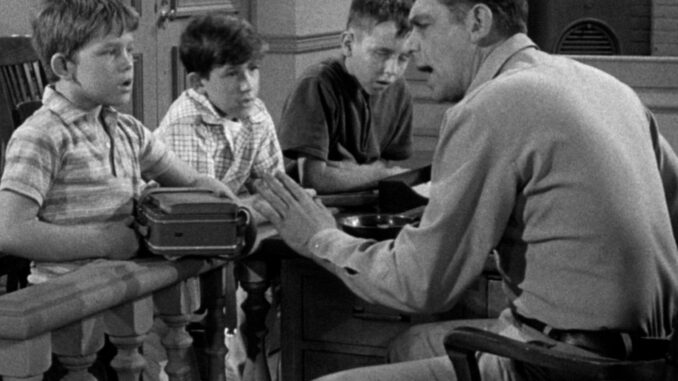
The air in Willow Creek always smelled of freshly cut grass, damp earth after a summer shower, and the faint, comforting exhaust of Mr. Henderson’s lawnmower. It was a town cradled in the gentle curve of a river, where screen doors slammed with rhythmic precision and the ice cream truck was less a vendor and more a harbinger of pure, unadulterated joy. This was our Mayberry, a kingdom where childhood reigned supreme, and the rules were mostly unspoken, learned through osmosis, and occasionally, bent with the enthusiastic resilience of youth.
Our mischief, then, was never malicious. It was the natural byproduct of boundless energy and unburdened imagination. We were the Willow Creek Marauders, a quartet of scrawny, sun-kissed boys, led by the irrepressible Billy “The Brain” Peterson, whose ideas, while occasionally brilliant, often skirted the edge of polite society. Our canvases were the town’s common spaces: the sleepy creek, the sprawling community park, the unmanicured edges of Farmer McGregor’s cornfield. One sweltering August afternoon, fueled by grape sodas and the sheer audacity of being ten, we stumbled upon the perfect canvas for our masterpiece: Mrs. Gable’s prize-winning petunia bed in the town square.
Mrs. Gable, bless her meticulous heart, treated her petunias like precious jewels. They bloomed in a riot of purple, pink, and white, meticulously watered and weeded, a testament to her unwavering dedication. To us, however, they were merely obstacles in our grand engineering project: a miniature dam intended to divert the flow from the sprinkler system into a glorious, muddy pond. We envisioned a miniature ecosystem, a fertile ground for tadpoles and dragonflies. The mud squished gloriously between our toes, the sun beat down on our bent backs, and the sheer exhilaration of creation, of shaping the world to our will, was intoxicating. We dug, we piled, we redirected, scattering petunias like discarded confetti, their delicate petals sacrificed to the glory of our muddy lake. We were oblivious, lost in the pure, unfettered joy of our Mayberry mischief.
The thrill of our engineering triumph lasted precisely until sundown, when the long shadows stretched across the town square, revealing not a miniature ecosystem, but a churned-up patch of ruin where Mrs. Gable’s pride once bloomed. The whispered rumors started before dawn, carried on the morning breeze with the scent of coffee. By lunchtime, every mother in Willow Creek knew. And by the time the dinner bell rang, the collective summons had gone out, a silent but unmistakable directive: “Be on the porch by seven.”
The porch was the crucible of accountability in Willow Creek. It was where lessons were imparted, where apologies were made, and where the boundaries of childhood were subtly redrawn. As the sun dipped below the horizon, painting the sky in hues of embarrassed orange and solemn purple, we sat in a trembling line on my dad’s wide front porch. Billy, usually so boisterous, was silent, his bravado deflated like a punctured tire. Jimmy fiddled with a loose thread on his shorts, while Mark stared intently at a scuff on his sneaker. My own heart thumped a nervous rhythm against my ribs, a drumbeat of impending doom.
Then they appeared. Not angry, not shouting, but a line of fathers, silhouetted against the deepening twilight. My dad, Mr. Peterson, Mr. Miller, and Mr. Davies. Their faces, usually etched with the familiar lines of laughter or weary contentment, were now composed into masks of quiet gravity. There was no fire in their eyes, only a profound disappointment that felt far heavier than any threat of a spanking. The air was thick with the scent of their aftershave, the ghost of pipe tobacco, and the unspoken weight of expectation.
My dad, the quietest of the group, was the one who spoke first. His voice was low, devoid of accusation, but laced with a weariness that cut deeper than any scolding. "Boys," he began, his gaze sweeping over our slumped forms, "Mrs. Gable called. She's… very upset about her flowers."
There was a pregnant silence, broken only by the chirping of crickets. No one looked up.
Then Mr. Peterson, Billy’s dad, cleared his throat. "We understand it might have seemed like fun at the time. But do you understand what you did?"
And that was it. Not a lecture, not a list of punishments, but a simple, direct question that demanded more than a "yes" or "no." It demanded introspection. It demanded empathy. It demanded that we step outside our self-contained world of play and into the shoes of someone else – someone whose joy we had carelessly trampled. We had thought of it as a game, a grand adventure. They were showing us it was an act with consequences, a disruption of the gentle order of our community.
The meeting with the dads wasn't about the immediate repercussions, though there would be plenty of those – weeks of weeding Mrs. Gable’s garden, apologetic notes, and the lingering shame of knowing we had caused genuine hurt. It was about something far more profound. It was the moment the invisible tether of consequence tightened, connecting our actions to the wider world. It was the dawning realization that freedom wasn't absolute, that our Mayberry, as idyllic as it was, operated on an unspoken covenant of respect and care.
That evening, as we replanted fledgling petunias in the dim light of Mrs. Gable’s porch, our hands still gritty with the mud of our undoing, the mischief felt less like a grand adventure and more like a careless mistake. The vibrant, carefree colors of childhood hadn't faded entirely, but they had been tinged with a new hue: responsibility. The meeting with the dads was our first real step across the threshold from the boundless, unthinking joy of childhood into the quieter, more complex landscape of growing up. It was the day Mayberry’s mischief met the weight of the world, and in that encounter, we began to learn what it meant to be a part of something larger than ourselves.